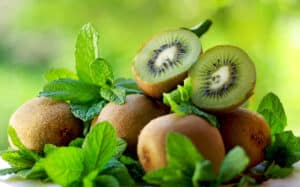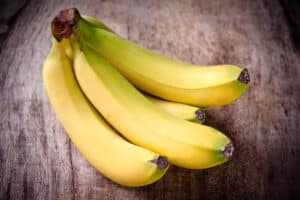According to the Centers for Disease Control and Prevention (CDC), 33% of Americans are not getting enough sleep. If you’re suffering from a lack of sleep or poor sleep quality, your diet could be a contributing factor. Improving your eating habits may help you improve your sleep quality.
Why Getting a Good Night’s Sleep Is So Important
Your quality of sleep is closely tied to your emotional, mental and physical health. Numerous studies have found that chronic poor sleep can increased your risk of:
- Heart disease
- Type 2 diabetes
- Dementia
- Obesity
- Breast, colon, ovarian and prostate cancers
Additionally, poor sleep can affect your ability to function while you’re working, driving or operating machinery, which can put you at risk of injury and poor work performance.
Sleep and Mental Health
Studies have found a consistent correlation between people’s quality of sleep and their mental health. According to the Columbia University Department of Psychiatry, sleep problems can contribute greatly to the onset or worsening of mental health disorders like anxiety, depression and even suicidal ideation.
Sleep and Mood
Harvard University’s Division of Sleep Medicine found a distinct relationship between sleep quality and mood. Many people who suffer from poor sleep quality report feeling irritable, angry, sad and exhausted.
Sleep experts also contend that this works both ways: Mental states can also affect sleep. People who are anxious often report sleep difficulties and are more susceptible to stress.
Sleep and Physical Health
Quality of sleep has a profound impact on physical well being. According to the U.S. Department of Health and Human services, sleep affects nearly every tissue in the human body. On top of the that, sleep plays a direct role in people’s:
- Stress and growth hormones
- Immune systems
- Blood pressure
- Cardiovascular health
- Breathing
- Appetite
Lack of sleep and poor sleep quality can also increase the risk of certain infections and reduce the efficacy of make some vaccines.
The Link Between Diet and Restful Sleep
Sleep experts do not yet know exactly how diet and sleep are connected, but they do know that there is a connection.
Studies have produced evidence that vitamin deficiencies can disrupt sleep cycles and get in the way if you’re trying to improve sleep. In general, you should try to eat a balanced diet made up of fruits, vegetables, nuts and omega-3 fatty acids. You can also use supplements for better sleep where necessary.
More importantly, you’ll want to avoid or limit red meat and foods that are heavily processed.
Foods That Promote Quality Sleep
There are numerous foods and drinks that may increase quality of sleep:
Almonds
Almonds are highly nutritious, loaded with nutrients and low in calories. A one-ounce serving of almonds contains:
- Up to 31% of the recommended daily amount of manganese
- Nearly 20% of the recommended daily amount of magnesium
- Almost 40% of the recommended daily amount of vitamin E
- Fewer than 175 calories
- A significant amount of melatonin, which helps to regulate the body’s internal clock
Sleep experts conducted a study in which they fed rats 400 mg of almond extract per day; they found the rats that consumed the almond extract slept longer and more deeply than the ones that did not.
Kiwis

Kiwis are loaded with vitamins, contain fewer than 50 calories and are one of the best foods you can eat before bedtime. One study found that people who ate two kiwis before bedtime fell asleep 42% faster and slept 13% longer than people who didn’t eat anything before going to bed.
Kiwis also aid in the production of serotonin; experts have identified a link between low levels of serotonin and insomnia.
Chamomile Tea
The reasons why chamomile promotes quality sleep are still largely unknown, but people have been using it to improve sleep for hundreds of years. There is evidence that chamomile reduces anxiety, insomnia and depression and can promote sleepiness.
Salmon

The omega-3 fatty acids in salmon and other fatty fish are thought to reduce anxiety and improve your sleep. Furthermore, salmon:
- Is rich in protein
- Is one of the few foods that contains a significant amount of vitamin D
- Contains numerous B vitamins
- Can reduce the risk of heart disease
- May promote healthy weight management
- Contains selenium, a mineral which reduces abnormal sleep patterns
Salmon is also high in mono- and polyunsaturated fats and makes a convenient snack because it comes canned or in sealed pouches that do not require refrigeration. If you don’t care for salmon, tuna and swordfish are both fatty fish and a great source of melatonin.
Turkey
Have you ever noticed that you can barely keep your eyes open after Thanksgiving dinner? This is because turkey contains tryptophan, an amino acid which experts have shown increases melatonin levels in the body.
Tart Cherry Juice
Tart cherry juice contains magnesium, phosphorous and potassium, which can improve sleep. In a small study, adults suffering from insomnia consumed two eight-ounce glasses of tart cherry juice per day.
At the study’s conclusion, researchers found that the participants slept an average of 84 minutes longer than before and reported better overall sleep quality.
Bananas

Bananas are rich in potassium and other nutrients and contain tryptophan. Bananas also contain antioxidants, which help protect your body from free radicals; researchers believe that free radicals play a role in heart disease and certain types of cancers, so a banana before bedtime can’t hurt.
Dark Chocolate
Dark chocolate contains a lot of magnesium and can help regulate your body’s circadian rhythms. Circadian rhythms are the physical, mental and behavioral processes that respond primarily to light and dark and affect nearly every living thing, according to the National Institute of General Medical Sciences.
Milk
Milk contains several compounds that are known to promote healthy sleep cycles. A glass of milk at bedtime may produce a calming effect that can help you fall asleep. Although there is little to no scientific evidence to support this, many people believe that warm milk is more effective for sleep than cold.
Frequently Asked Questions
Here are some common questions people ask about the best foods for sleep.
What Fruit Is Highest in Melatonin?
Several fruits are good sources of melatonin, but cherries have the highest concentration; sour cherries boast twice the amount of melatonin that sweet cherries do.
What Foods Help With Sleep Apnea?
The best foods for sleep apnea are those containing vitamins C and E, melatonin and omega-3 fatty acids, so fresh fruits and vegetables, juice and fatty fish all make great bedtime snacks.
What Foods Induce Sleep?
Foods that induce sleep are those containing melatonin, tryptophan and Vitamins B, C, E and K, so you might want to experiment with these foods until you find a combination that works well for you.
What Fruits and Vegetables Are Best for Sleeping?
These are the eight best fruits and vegetables for sleeping:
- 1. Cherries
- 2. Bananas
- 3. Pineapples
- 4. Oranges
- 5. Avocados
- 6. Kale
- 7. Lettuce
- 8. Tomatoes
What Foods Can Make Sleep Apnea Worse?
Spicy foods and foods containing acids can cause heartburn and worsen acid reflux, which exacerbates sleep apnea. If you have sleep apnea, you should avoid these foods for at least three hours prior to bedtime.
What Vitamins and Minerals Help You Sleep?
Magnesium, manganese, calcium, B vitamins and potassium all play a role in sleep. Additionally, vitamin deficiencies in general are linked to poor sleep, so you should shoot for a well-rounded diet to avoid sleep difficulties.
What Foods Should You Avoid Before Bed?
In addition to spicy foods that can trigger acid reflux, you should avoid foods that cause gas and drinks that contain caffeine, especially fried foods, coffee and energy drinks. You should also avoid or limit your alcohol consumption.
The Takeaway
Sleep experts don’t know all the particulars yet, but a healthy diet is obviously a crucial component of sleep hygiene. There is compelling evidence that foods rich in vitamins B, C, E and D, melatonin, omega-3 fatty acids and tryptophan all play a role in helping you fall asleep faster, stay asleep longer and enjoy a better night’s sleep.







